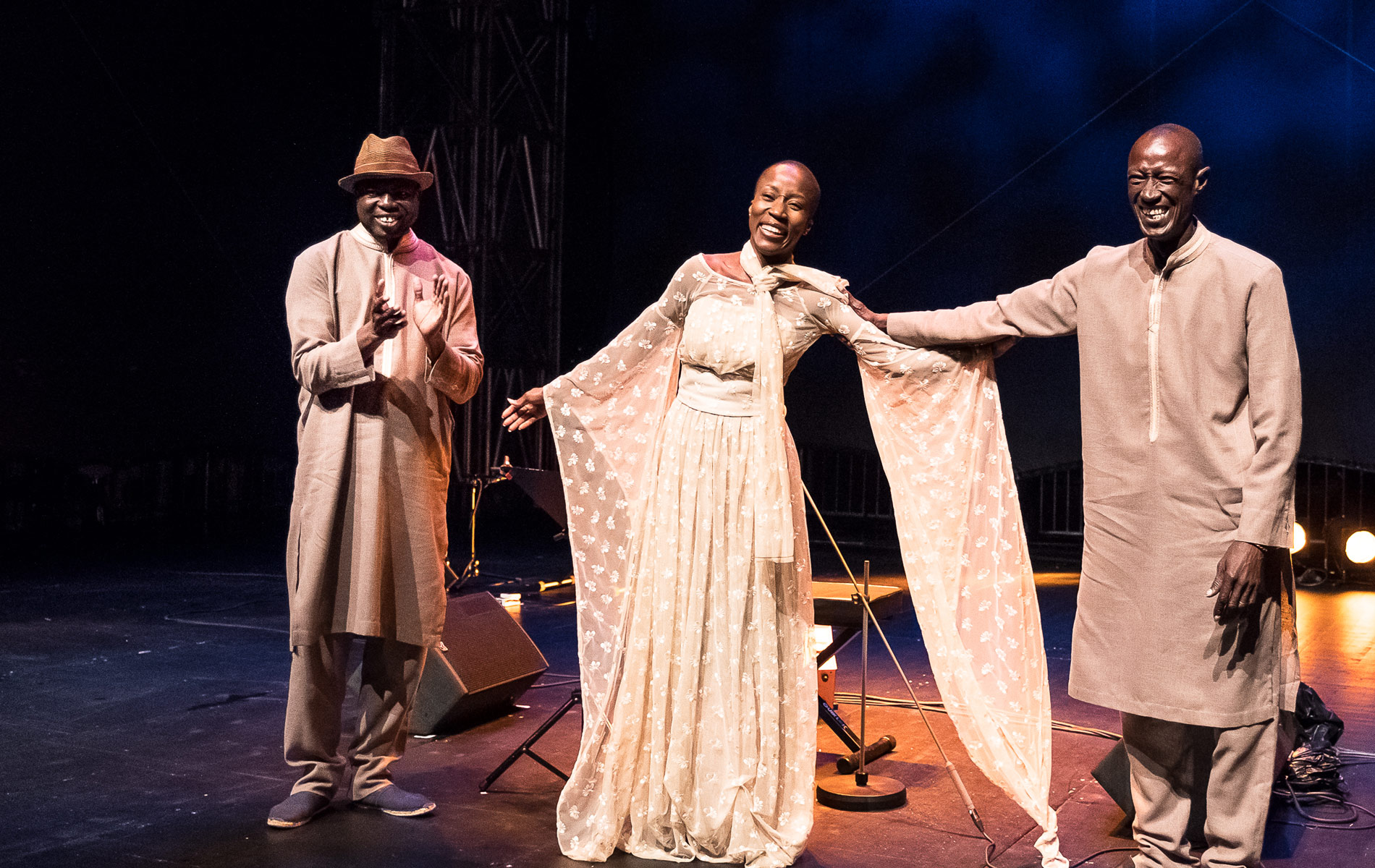
Booking: spectacles@rokiatraore.net
What the French Press say about the show:
«Rokia Traoré as an enchanting storyteller (…) a gentle and magnificent evening» Le Monde
«Spokeswoman for a flamboyant Africa» France Inter
“Infinitely gracious” Release
«Sensitive and powerful» Provence
“Bright (…) Healthy” Toutelaculture.com
«The Malian artist has subdued Avignon» Le Point
My roots are deeply anchored in the Mandingo culture. Yet I wasn’t immersed in Malian music at the source, having spent most of my childhood outside Mali moving with the work of my father who was a diplomat. On top of that, as a noble Bambara, not belonging to a griot caste (1) prevented me from learning and interpreting traditional griot songs.
I started learning about music; I was not supposed to do so and was criticized within my social environment. It was therefore more natural for me and less controversial for my entourage to take up playing the guitar, writing texts in French and English. Drawing my own artistic path I avoided taking any role that would normally be exclusively pursued by a member of the djeli (1) caste. Rock ‘n’ roll was more accessible to me than playing at weddings or christening ceremonies where young djelis learn alongside their parents, to sing the traditional music repertoire.
To exist as an artist, I had to take a great creative detour to gain a few years of experience in the practice of a musical style that I invented for myself, taking advantage of any breach or small window of tolerance that celebrated modernity within Mali’s highly traditionalist society. For years my goal was and still is, to expand the scope of freedom for my artistic work.
When I had the opportunity to meet Bako Dagnon a great djélimousso from the Kéla (2) region, I had already made five albums and worked on several projects during a fifteen-year career. The writing had been finished for years, but I lacked the knowledge of classical songs related to the Mandingo epic history. Only djelis can teach these songs and their stories and Bako Dagnon is one of the djelis closest to the spirit of Mandingo culture and djéliya (3) . The teaching that I received from her enabled me to complete my project.
The Dream Mandé – Djata project is structured around the griot tradition of oral history story telling. At the same time, it is a modern project born out of inevitable changes to the form that can complement the past using contemporary concepts, a vision or contextualized perception that goes against tradition.
The narrative of the show adopts part of the story of Soundiata Keïta and the empire of the Mandé. The text is told in French or English in the manner of the griots, interwoven with classical songs of the Mandingo epic history.
Accompanied by a ‘fina’, Mamadyba Camara on kora, and a djéli, Mamah Diabaté on n’goni, I have the privilege to base my work on a music that is one of the most beautiful and delicate of Africa.
The musical monologue element unfolds as a musical structure that is created out of moments of total or partial withdrawal of the sound of the instruments so that we hear only the melodies and movement from the spoken or sung voice.
While griots do not always agree on the precision of time and facts of history, in the repertoire of the Mandingo epic each melody has a meaning and has been composed or modified for a specific occasion and marks a precise time or period in the history of Mandé.
With this project, it is not only the interpretation of classical songs that interests me but also the natural, intense and profound dramaturgy found within the griot tradition of story telling. My ambition is to transcribe a griot story outside the Mandingo language while preserving the meaning of every gesture, every word, every original belief.
Rokia Traoré
(1) Within the empires and kingdoms of West Africa, social organisation led to a division of roles or caste system organised so that particular families, tribes or ethnic groups would exclusively perform certain roles with hereditary transmission of their craft, the doctrine that supports it and their position. Thus in the Mandé region the organisation of this period can be summarized as follows:
a. Griots or djelis were responsible for everything related to music. They embedded history and important events into music. Whole families would dedicate their lives to making or playing instruments, sometimes both.
b. Djélimousso: A woman from the djéli caste.
c. Finas or Founes were masters of the word. They were the spokesmen and messengers of a society where writing did not exist and where the rules of nobility prevented free public expression for ordinary farmers and fishermen. It remains one of the current functions of finas to speak over the music and songs of the djelis during public events. They give details and comment on the story the djeli is singing about. They can also be social mediators during an engagement, a christening, or in a conflict.
d. The Noumou mastered iron, earth, and fire. They were the healers, practiced surgery and circumcision, made weapons and cooking utensils.
e. Garankés were craftsmen, apart from metal craft (exclusively the work of the noumous because it requires the control of fire) the garankés would work leather skins. They made weapon sheaths, harnesses, shoes and pieces of armour. The garanké women were in charge of everything related to female aesthetics: tattoos, makeup and hair.
In the present day all of these different types of family, once the pillars of an organization too complex to describe in this paragraph, are called griots.
(2) Kéla is a griot village in the Mandé region
(3) Djéliya is the ideological concept that governs the function of the djelis.
Dates:
Pas de concerts programmés

